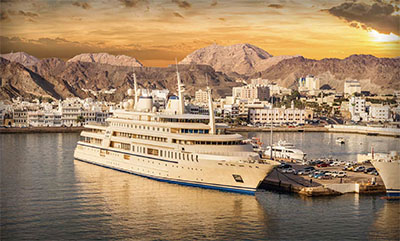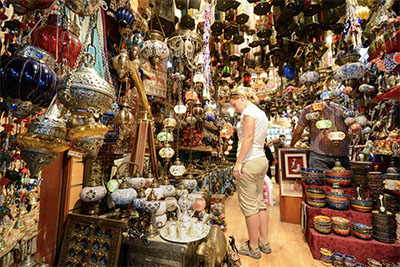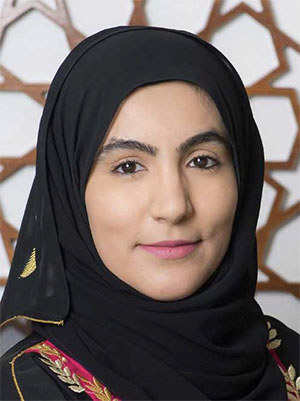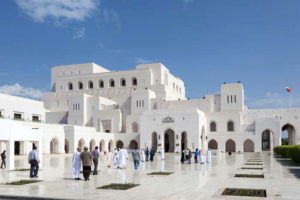SITUATED ON THE ARABIAN PENINSULA, often amid Middle East chaos and turmoil, Oman manages to maintain a countenance of decorum and civility. Evading military clashes between its neighboring states, it implemented long-range plans for development and emergence. Much of the activity focuses on its capital city, Muscat.
Lying between the El Hajar Mountains and the Arabian Sea, Muscat serves as the seat of the country’s political, administrative and economic systems and home to a third of the country’s 4.5 million residents. With its proximity to the sensitive Strait of Hormuz, Muscat proved a historically important trading port in the Gulf of Oman, attracting foreign tradesmen and settlers who came to trade in fishing and agriculture. Persians, Spaniards and Ottomans were among overseas travelers to ancient Muscat, admired as “very elegant” by a 16th-century Portuguese writer.
Muscat’s sprawling 1,400 square miles divide into three principal urban areas: Muscat proper, the original settlement and now an enclave of restored historic homes and buildings; Waterfront Muttrah, the harbor scene of shipping and cruise ship anchorages, upgrading to enhance its appeal to visiting tourists; and the commercial district centered in Ruwi, a cluster of high-rise apartments, office buildings and headquarters of international companies.
Ruled since the 18th century by the Al Said Dynasty, friction with imams of the interior destabilized the sultanate until 1970 when Qaboos bin Said, with assistance from the British, overthrew his father in a bloodless coup. Consolidating and renaming the region the Sultanate of Oman, Sultan Qaboos united tribal territories and launched programs to end the country’s isolation and to use oil revenues for modernization and development. Slavery was abolished, and freedom of religion was allowed.

Port of Muscat © WAUPEE – DREAMSTIME.COM
To promote internal stability and to supplement expats and immigrants, in 1988 the country initiated Omanization. The local population is enlisted and trained to integrate into the workforce, expanding the economy and infrastructure. Companies are rewarded for increasing their quota levels toward the target goal of 72 percent local personnel. Five-year development plans initiated in 1976 resulted in the establishment of the petroleum industry; construction of the new shipping port, Mina Qaboos; and new ministries for social services, health, education and the tourist industry. Oman emerged with a higher standard of living than that of neighboring countries.
As it has throughout history, trade dominates the economy, with oil products joining the traditional exports of dates, fish and mother-of-pearl. Muscat is home to multibilliondollar conglomerate CK Industries, and major trading companies Suhail Bahwan Group and Saud Bahwan Group partnered with dozens of international corporations including Toshiba, Toyota, Hewlett-Packard, Mitsubishi, General Motors and Chrysler. Petroleum Development Oman — a joint operation of the government, Shell, Total and Partex — reported a combined oil, gas and condensate production record for 2016 equal to 1.29 million barrels of oil equivalent per day, with a growing expansion into hydrocarbon, renewable energy generation and water management. Established in 1988, the principal stock exchange, the Muscat Securities Market, operates with transparency, disclosure regulations and requirements. Numerous hospitals, clinics, universities and schools thrive in the private sector.

Arabian lamps for sale at a souk © LUKASZ KASPEREK – DREAMSTIME.COM
The country applies a multitude of assets to lure investors: the educated and largely bilingual workforce; good health care and schools for families; easy access to global markets through a modern infrastructure network; and a stable, secure and predictable investment climate. Dependent on imported goods, Oman promotes policies that welcome entrepreneurs and small businesses. Grain and vegetable farming, gas stations and haulage, tourism and perfume shops, electronics and home appliances, commodity stores, bars and restaurants list among suggested venture opportunities.
Clearly, the leadership of Sultan Qaboos deserves credit as a key to Oman’s progress. The longest-serving monarch in the Arab world, a devotee of opera and classical music, he received his education in India and at the Royal Military Academy Sandhurst in England. While his rule is absolute, he is said to rely more on the business elite than on family members for counsel. Nearing age 80 with no clear heir, the delicate issue arises of whether his successor would maintain absolute power or take steps to separate state powers.
Peaceful protests following the Arab Spring raised issues of job opportunities, salary increases, establishment of Islamic banks and expulsion of some current ministers. But for the time being, the outlook for Muscat includes a continued, methodical integration into the global scene.
CHECKING IN WITH HAURA AL-WAHAIBI

Haura Al-Wahaibi © HAURA AL-WAHAIBI
Oman Commercial Attaché, Washington, D.C.
Embassy of The Sultanate of Oman in the United States
Living in America, what do you miss about Muscat?
I miss special occasions, national and religious holidays, and weekends when extended families get together and have picnics and trips, every time to different places. Also I miss the weather — it can be hot there, but at least it is warm and sunny. Mainly, I miss the people.
How has the country changed during your lifetime?
My mother didn’t have the opportunity to study; school was limited to boys. And Muscat’s big city gate closed after sunset. You were either locked in or locked out. You had to go through the government to get eyeglasses. Now His Majesty modernized education and health, and everybody is happy about the changes.
Why is Muscat a good place to do business, and what are compelling opportunities?
The government supports foreign direct investment, offering a package of incentives: five years’ tax exemption, plus Americans have 100 percent ownership of their companies and can send their money home with no restrictions. Business is flourishing because Oman has spent a lot of money developing the seaport and the new airport. We focus on economic zones, free zones and seaports that are logistic hubs. South of Muscat, Duqm on the Indian Ocean is the largest economic zone in the Middle East.
Trade is good business — shipping American products not only for use in Oman but for distribution. We have storage and seaports, so it is easy to distribute to the Middle East and to Indian and African markets.
MuscatWe deal with men and women like brother and sister, even in government and operations. We are equal, and the government believes in women and gives preference to them.
What tourism is encouraged, and is the country safe to visit?
We focus on culture and community-based activities in nature. Oman has wilderness parks, mountains, beach resorts and a combination of sea and mountains you can’t find in other Middle Eastern countries. Oman is one of the safest countries in the world, 100 percent safe. The Omani people and our leaders don’t believe in war and self-promotion. Oman has no issue with its neighbors.
Is there concern about leadership after Sultan Qaboos?
Our government is stable. We don’t have your kind of competition between parties. We are working in one party and one system, so we don’t have competition about who will rule.
Things to Do in Muscat
History, beaches and culture provide abundant options for sightseeing and recreation. Visitors can charter boats for fishing and diving. The waterside corniche lined with date palms and monuments connects the historic fish market and extensive bazaar. Follow it south toward the massive city gates into the ancient center, now a region of restored historic adobe huts and flowery boulevards surrounding the sultan’s palace. Scattered in both regions, museums feature culture and folklore, and tourist attractions include restored Portuguese forts. Keep in mind offices close for lunch from noon to 2:30 p.m.; stores close from noon to 1 p.m., then remain open until 8 p.m.

The Royal Opera House Muscat © TYPHOONSKI – DREAMSTIME.COM
At night, the area north of Seeb transforms into a warren of fish restaurants and clubs where shop windows display dazzling, colorful women’s ensembles of harem pants, gauzy veils and jangling coinage. The multidisciplinary Royal Opera House presents an incredible array of programs, among them ice skating shows, La Traviata, classical ballet, blues, a Mahler symphony, timeless Arab songs and the Chucho Valdés Quintet. Oman’s leading arts and cultural institution, this mammoth gold and marble structure, surrounded by extensive gardens, merits a visit in itself.
Muscat Info to Go
Lying about 20 miles south of the old city on Sultan Qaboos Highway and originally called Seeb, Muscat International Airport is the country’s main airport and the hub for Oman Air and Salam Air. A new passenger terminal with 118 check-in counters and 45 gates opened in 2018, with further expansion planned to number it among the world’s top 20 airports by 2020. Public buses stop in front of the airport area; hotel shuttles are preferred. Blue-andwhite metered taxis to the business district cost around $25.
Muscat: Just the Facts
Time zone: GMT +4
Phone code: Country code: 968 City code: 24
Currency: Omani rial
Key industries: Oil, manufacturing, transportation, tourism, fisheries, agriculture, mining
COMING AND GOING
U.S. citizens must have a valid passport with six months validity and a visa. No sponsor is required for 10-day, single-stay visas, which can be obtained online. Visas must be used within a month of approval; the fee is $62.
OFFICIAL LANGUAGE
Arabic is official; many residents are familiar with English. Hindi and Urdu are common among the sizeable Indian population
Where to Stay in Muscat
AL BUSTAN PALACE, A RITZ-CARLTON HOTEL Said to be one of the world’s finest hotels, this splendid urban resort is a favorite project of Sultan Qaboos. Al Bustan Street, Quron Beach $$$$$
GRAND MILLENNIUM MUSCAT Conveniently located in the heart of the city’s business and diplomatic district near the two great malls, this 5-star hotel offers a Zanta spa and meeting rooms with panoramic city views. Dohat al Adab Street, Al Khuwair $$$
KEMPINSKI HOTEL MUSCAT Arab and contemporary décor blend in this luxury 5-star beach resort with spa, tennis court and watersports on its three-mile stunning coastline. 335 Street 6, Al Mouj $$$$
Restaurants in Muscat
AL ANGHAM Situated within the impressive Royal Opera House complex, Al Angham features Omani culture and décor, dishes, motifs and silverware inspired by the Sultanate’s heritage. Royal Opera House, Sati Al-Qurmt $$$$
BAIT AL LUBAN Situated with views of the old port, the “house of Omani hospitality” serves traditional meals combining flavors from the early trading routes to East Africa and India. Al Mina Street, Muttrah Corniche $$$$
KURKUM Indian cooking — biryani, prawn curry, coconut rice — is the focus at this cozy and casual spot on the Corniche near the souk on Muttrah Harbor. Way No. 08, Muttrah Corniche $$$
Read This Next

Introducing
FX Excursions
FX Excursions offers the chance for once-in-a-lifetime experiences in destinations around the world.
#globility
Insta FeedAirlines
Jan 14, 2025Turkish Airlines Introduces UNESCO Türkiye Series Amenity Kit Collection
Turkish Airlines recently launched a new amenity kit collection, known as the UNESCO Türkiye Series. Inspired by six of Türkiye’s UNESCO World Heritage sites, the amenity kit collection allows the airline to bring the country’s cultural treasures to the skies.
Sponsored Content
United Airlines First to Purchase Sustainable Aviation Fuel for ORD
Chicago O’Hare International Airport will soon receive sustainable aviation fuel, all thanks to United Airlines, which became the first airline to purchase SAF for use at the airport, one of the largest in the United States. Neste, a producer of SAF, will provide up to 1 million gallons of its Neste MY Sustainable Aviation Fuel. The first supply arrived in August.
Daily
Jan 14, 2025Costa del Sol, Spain, Doesn’t Hold Back for 2025 Travelers
With the arrival of a new year, Costa del Sol invites travelers to explore its culture, gastronomy, sustainability and wellness offerings. For those looking to disconnect from stress, immerse with nature and discover new cultures, this province of Málaga offers plenty of activities to keep up with your 2025 resolutions. Need some convincing?
Daily
Jan 14, 2025First NH-Branded Hotel Debuts in Bangkok
Minor Hotels, in partnership with Boulevard Hotel Company Limited, opens NH Bangkok Sukhumvit Boulevard hotel, the first NH Hotels & Resorts-branded property in Thailand’s capital.
Sponsored Content
Sailing the Ionian Sea: Explore Greece’s Nautical Gems
Sailing the Ionian Sea is an enchanting way to experience Greece's breathtaking islands and pristine waters. Known for its favorable winds, calm seas and stunning landscapes, the Ionian Sea offers a paradise for both experienced sailors and those looking to explore for the first time. From lively beaches to secluded bays, these waters have something for every traveler seeking adventure and relaxation.
Daily
Jan 13, 2025Nader Sculpture Park Opens in Miami’s Design District
The latest addition to Miami Design District is Nader Sculpture Park. Founded by art collector Gary Nader and designed by Bea Pernia of BEA Interiors Design, this park is an open- air collection of more than 50 large-scale sculptures residing within Miami’s celebrated neighborhood of fashion, design, art, architecture and dining. Pernia, distinguished by her knack for blending organic materials into expressions of elegance, also has a studio in the city’s design district.
7 Reasons to Ski in Slovenia
Daily
Jan 10, 20257 Off-the-Beaten-Path Asian Hotels
Daily
Jan 10, 2025Daily
Jan 9, 2025New Spier Hotel Launches This Spring in South Africa’s Western Cape
Lauded for its outstanding wines and regenerative farming practices, Spier Wine Farm in South Africa’s Western Cape region prepares to welcome its first guests to its new hotel this spring, with an opening planned for March. Owned by the Enthoven family, the wine estate is located within a protected area known as Cape Floral Kingdom.
Sponsored Content
Discover the Pristine Beauty of the Sporades Islands
Nestled in the northwest Aegean Sea, the Sporades Islands are a hidden gem of Greece, offering breathtaking natural beauty and unique experiences for every traveler. Comprised of four main islands — Skiathos, Skopelos, Alonissos and Skyros — this island cluster is renowned for its lush pine forests, crystal-clear waters and idyllic beaches.
Daily
Jan 9, 20255 Wellness Journeys to Try at COMO Hotels & Resorts This Year
Jumpstart your 2025 wellness goals and book one (or more!) of COMO Hotels and Resorts’ COMO Wellness Journeys, held at properties around the world throughout 2025.
ShareThis